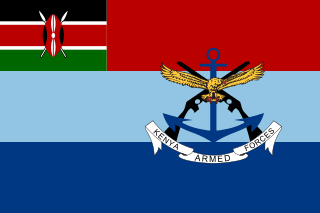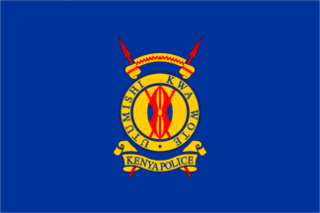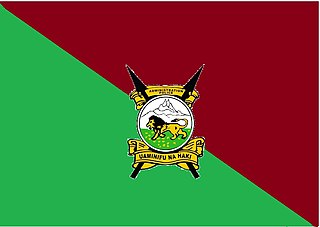
The Kenya Defence Forces (KDF) are the armed forces of the Republic of Kenya. They are made up of the Kenya Army, Kenya Navy, and Kenya Air Force. The current KDF was established, and its composition stipulated, in Article 241 of the 2010 Constitution of Kenya; it is governed by the KDF Act of 2012. Its main mission is the defence and protection of the sovereignty and territorial integrity of Kenya, recruitment to the KDF is done on yearly basis. The President of Kenya is the commander-in-chief of the KDF, and the Chief of Defence Forces is the highest-ranking military officer, and the principal military adviser to the President of Kenya.

The Luxembourg Armed Forces are the national military force of Luxembourg. The army has been a fully volunteer military since 1967. As of December 2018, it has 939 personnel.

Military police (MP) are law enforcement agencies connected with, or part of, the military of a state. In wartime operations, the military police may support the main fighting force with force protection, convoy security, screening, rear reconnaissance, logistic traffic management, counterinsurgency, and detainee handling.

The King's African Rifles (KAR) was a British Colonial Auxiliary Forces regiment raised from Britain's East African colonies in 1902. It primarily carried out internal security duties within these colonies along with military service elsewhere during the world wars and other conflicts, such as the Malayan Emergency and the Mau Mau uprising. The regiment's enlisted soldiers were drawn from the native Africans, while most officers were seconded from the British Army. During the 1960s, as part of the decolonisation of Africa, more African officers were commissioned into the regiment before it was gradually disbanded. KAR battalions would go on to form the core of newly established armed forces throughout East Africa.
Commandant is a title often given to the officer in charge of a military training establishment or academy. This usage is common in English-speaking nations. In some countries it may be a military or police rank. It is also often used to refer to the commander of a military prison or prison camp.

The Canadian Forces Military Police provide police, security and operational support services to the Canadian Armed Forces (CAF) and the Department of National Defence (DND) worldwide.

The Bereitschaftspolizei, BePo, are the support and rapid reaction units of Germany's police forces. They are composed of detachments from the Federal Police and the State Police forces of Germany.

The SAF Military Police Command is the military police formation of the Singapore Armed Forces (SAF). Established as the Singapore Armed Forces Provost Unit (SAFPU) in 1966, its primary role is to police duties to uphold standards of discipline within the SAF, and to provide security coverage for key SAF military installations and the Ministry of Defence (MINDEF) headquarters at Bukit Gombak.
The 1982 Kenyan coup d'état attempt was a failed attempt to overthrow President Daniel arap Moi's government. At 3 A.M. on Sunday, 1 August 1982, a group of soldiers from the Kenya Air Force took over Eastleigh Air Base just outside Nairobi, and by 4 A.M. the nearby Embakasi air base had also fallen. At 6 A.M. Senior Private Hezekiah Ochuka and Sergeant Pancras Oteyo Okumu captured the Voice of Kenya radio station in central Nairobi, from where they then broadcast in English and Swahili that the military had overthrown the government. Working at the behest of Ochuka, Corporal Bramwel Injeni Njereman was leading a plot to bomb the State House and the General Service Unit headquarters from the Laikipia Air Base, Nanyuki. Corporal Njereman forced three pilots to fly two F-5E Tiger jets and a Strikemaster that would be used for the mission. However, Major Mutua was aware that Corporal Njereman had never flown a jet fighter before and would likely not be able to cope with the g-forces. The pilots, while communicating on a secret channel, agreed to execute daring manoeuvres to disorient their captor. The trick worked. The pilots dumped the bombs in Mt. Kenya forest and headed back to Nanyuki.

The Kenya Police Service is a national body in charge of law enforcement in Kenya. It is subordinate to National Police Service which is headed by Inspector General of Police who exercises independent command over the Service. Kenya Police is headed by Deputy Inspector General. Kenya Police is divided into Service Headquarters in Nairobi, Formations, General Duty Commands and Training Institutions.

The Administration Police Service (APS) is a paramilitary security organization and is a branch of the Republic of Kenya's National Police Service.

The Ghana Army is the principal land warfare force of Ghana. In 1959, two years after the Gold Coast became independent from the British Empire, the Gold Coast Regiment was withdrawn from the Royal West African Frontier Force and formed the basis for the new Ghanaian army. Together with the Ghana Air Force and Ghana Navy, the Ghana Army makes up the Ghana Armed Forces, which is controlled by the Ghanaian Ministry of Defence and Central Defence Headquarters, both of which are located in the Greater Accra Region.
The Shifta War or Gaf Daba (1963–1967) was a secessionist conflict in which ethnic Somalis in the Northern Frontier District (NFD) of Kenya attempted to join Somalia. The Kenyan government named the conflict "shifta", after the Swahili word for "bandit", as part of a propaganda effort. The Kenyan counter-insurgency General Service Units forced civilians into "protected villages" as well as killing livestock kept by the pastoralist Somalis.

Kenya's National Police Service (NPS) is the umbrella law enforcement organ in Kenya. The service was established in 2011 under Article 243 of the Constitution of Kenya, following dissolution of Kenya Police Force and Administration Police Force.

The General Operations Force is the light infantry arm of the Royal Malaysia Police. The General Operations Force was established in 1948 during the Malayan Emergency by the British Administration when Malaya was a colony. The police service was mobilised to the field role, primarily to engaging Communist guerrillas during the emerging Insurgency. When Malaysia was formed in 1963, this law enforcement unit was then known as the Police Field Force. The title was adopted when it dropped the previous handle widely referred to as the Jungle Squad.

East Africa Command was a Command of the British Army. Until 1947 it was under the direct control of the Army Council and thereafter it became the responsibility of Middle East Command. It was disbanded on 11 December 1963, the day before Kenya became independent, and replaced by British Land Forces Kenya, tasked with withdrawing all remaining British troops. All remaining troops left by December 1964 and British Land Forces Kenya was disestablished.

The Kenya Army is the land arm of the Kenya Defence Forces.

The 267th Chemical Company was a military unit of the U.S. Army Chemical Corps responsible for the surety of chemical warfare agents dubbed "RED HAT" deployed to the Islands of Okinawa, Japan and subsequently Johnston Atoll in the Pacific Ocean. A recently discovered Army document reveals that the true mission of the 267th Chemical Company was the operation of the Okinawa deployment site as part Project 112. Project 112 was a 1960s biological warfare field test program that was conducted by the Deseret Test Center. Okinawa is not listed as a test site under Project 112 by the U.S. Department of Defense.
The 1st Carabinieri Mobile Brigade is a Carabinieri formation tasked with riot control, civil defence and security duties.
The Special Program for Embassy Augmentation and Response (SPEAR) is an antiterrorism and policing force in select regions around the world, designed to respond to crises and threats to US diplomats as well as US embassies and diplomatic missions. Law enforcement personnel from host nations are chosen to be members of SPEAR and are trained by the Diplomatic Security Service's (DSS) Office of Antiterrorism and Assistance (ATA). SPEAR was established in 2014 in the aftermath of the 2012 Benghazi attack, in nations where the ability to protect high risk U.S personnel and property were weak. Since its inception, SPEAR personnel have by mid-2021 provided extra security for more than 500 diplomatic affairs.


















